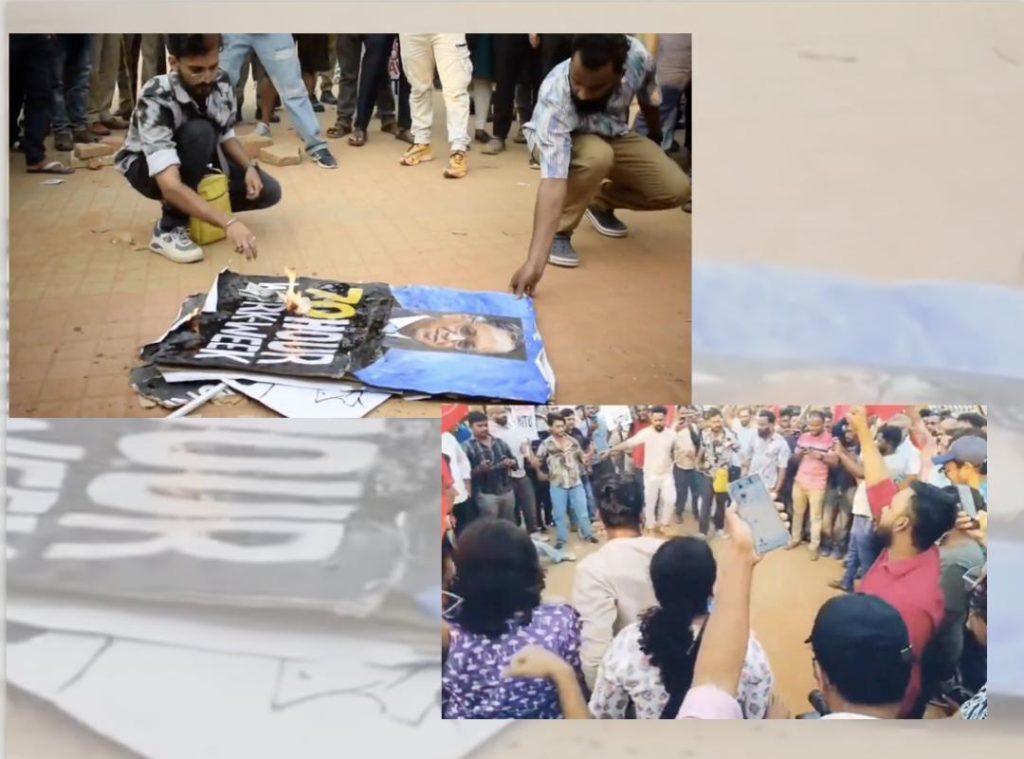
IT Employees Burn Murthy, L&T Chief’s Effigies for Proposing Longer Workweeks
The Indian IT industry has been plagued by issues of overwork, burnout, and poor work-life balance for a long time. The recent comments by two prominent industry leaders, Infosys Founder Narayana Murthy and L&T Chairman SN Subrahmanyan, have sparked outrage among IT employees. Both Murthy and Subrahmanyan have suggested that employees should work longer hours to boost productivity and meet the demands of their clients. However, their comments have been met with widespread criticism and resistance from IT employees.
To protest against these exploitative work practices, employees of the IT industry came together under the umbrella of KITU (Karnataka IT Union) and staged a demonstration in Bengaluru. The protest, which turned violent, saw employees burning effigies of Murthy and Subrahmanyan. Despite efforts by the Bengaluru Police to stop them, the protesters managed to torch the effigies, symbolizing their discontent with the industry’s work culture.
The incident took place on a recent Saturday, when hundreds of IT employees gathered in front of the Karnataka State IT/ITeS Employees Federation (KSSUTEF) office in Bengaluru. The protesters, who were mostly young professionals, carried placards and banners with slogans against overwork and in favor of better working conditions. They also chanted slogans and shouted anti-Murthy and Subrahmanyan slogans, demanding that they retract their comments.
The trouble started when a group of protesters, led by KSSUTEF President, Prashanth Suresh, attempted to burn the effigies of Murthy and Subrahmanyan. The police, who were present at the spot, tried to intervene and stop the protesters, but they were unsuccessful. The protesters managed to set the effigies ablaze, despite the police’s efforts to douse the flames.
The incident has sparked a heated debate about the state of the IT industry in India. While some have argued that the industry needs to adopt a more flexible and efficient work culture to remain competitive, others have pointed out that the constant demands for longer work hours are taking a toll on employees’ mental and physical health.
Narayana Murthy, in an interview with a leading business daily, had suggested that IT employees should be willing to work 70-hour weeks to meet the demands of their clients. He argued that this would not only boost productivity but also help employees earn more. However, his comments were met with widespread criticism, with many arguing that this would only lead to burnout and demotivation among employees.
SN Subrahmanyan, the Chairman of L&T, had also suggested that IT employees should work 90 hours a week. He argued that this would be necessary to meet the demands of the industry and to remain competitive. However, his comments were criticized by many, who pointed out that this would only lead to a decline in employee morale and a rise in turnover.
The incident has also raised questions about the state of labor laws in India. While the Indian government has made efforts to protect employees’ rights, the reality on the ground is different. Many IT companies have been accused of violating labor laws and exploiting employees. The incident has highlighted the need for stronger labor laws and better enforcement mechanisms to protect employees’ rights.
In conclusion, the incident of IT employees burning effigies of Murthy and Subrahmanyan is a symptom of a larger issue. The IT industry in India needs to adopt a more humane and employee-friendly work culture. The constant demands for longer work hours are taking a toll on employees’ mental and physical health, and it is high time that industry leaders and policymakers take notice.



